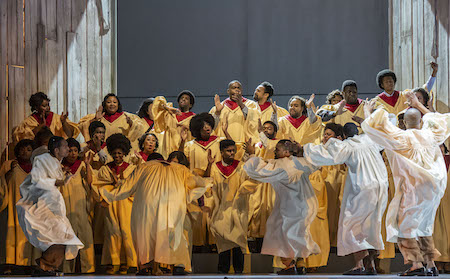Jan 13, 2026 2:09 PM
More Trump-Kennedy Center Cancellations
The fallout from the renaming of the John F. Kennedy Center for the Performing Arts to include President Donald…

Terence Blanchard’s Fire Shut Up In My Bones is only the second work by a Black composer to be featured at the Lyric Opera of Chicago.
(Photo: Todd Rosenberg)If the goal of the Lyric Opera of Chicago was to attract a more diverse crowd by programming jazz composer/trumpeter Terence Blanchard’s Fire Shut Up In My Bones, the revered institution clearly succeeded. The last and sold-out performance on April 8 brought in a younger constituency and a sizable African-American contingent.
Premiered at the Opera Theatre of Saint Louis in 2019 and presented at New York’s Metropolitan Opera in 2021, Fire is only the second work by a Black composer to be featured at the Lyric in its 136-year history. (The first was Anthony Davis’ Amistad in 1997.) Blanchard’s opus is based on New York Times columnist Charles M. Blow’s memoirs, the tale of a lonesome upbringing in a rural Louisiana community and of sexual molestation at the hands of an older cousin named Chester.
Act One serves as a flashback with Charles, a college student, reminiscing about his childhood at age 7 and, most importantly, the abuse. Musically, it delivers the goods with memorable tunes and an adroit weaving of the classical tradition and the jazz idiom with the astute addition of a stellar rhythm section featuring Chuck Webb on bass, Jeff “Tain” Watts on drums and Chicago rising star Stu Mindeman on piano. From a dramatic standpoint, particularly effective is the ploy designed to have Charles hover over every scene, in company of the spirit-like Loneliness/Destiny, sometimes singing in unison with his former self. Overall, the act consists of colorful tableaus, including the chicken factory scene where Charles’ mother, Billie, works, and the bar scene where she confronts her philandering husband, Spinner — they both provide a fair share of grim humor and a blues-informed backdrop. Also worth mentioning is the part leading to the assault, which features a pulsating melody that could have been drawn from a musical.
Following the intermission, the second and third acts portray a college-age Charles struggling with how to deal with his trauma, his feelings painfully divided between shame, anger and revenge. As the story becomes more gut-wrenching, the score comes up short, more uniformly neoclassical with just a few dashes of jazz and R&B. Perhaps Blanchard felt that the music should not upstage the emotions conveyed by the singers.
These two acts’ most enjoyable moments are a choreographed dream sequence (a visualization of Charles’ psyche) as well as a male college cheerleading routine that enthralled the audience in spite of the absence of music — an idea that Blanchard should have also used during the baptism scene at a church. Indeed, the gospel choir could have easily dispensed with accompaniment. Even conductor Daniela Candillari, who comfortably handled the genre-melding score, took and, in particular, excelled in the robust and soaring brass passages, could not inject much life, failing to support a high-octane chorus as a result.
The libretto by director/screenwriter Kasi Lemmons alternates poetry and down-to-earth language — if not profanities. When was the last time you heard the word “motherfucka” uttered from the Lyric stage? Several sentences are used effectively as leitmotifs throughout the performance. “I was once a boy of peculiar grace” underlines the hero’s constant struggle, while “Sometimes you just gotta leave it in the road” takes all its meaning at the opera’s conclusion when Charles finally resolves to give up on his revenge fantasy.
Producing an opera in the time of a pandemic can bring his slew of challenges, as the Lyric discovered. For this final performance, the three lead roles had to be recast. Thus, Justin Austin from New York’s Met was flown in at the last minute to replace Will Liverman as Charles. Brittany Renee filled the shoes of Jacqueline Echols for the ubiquitous Destiny/Loneliness/Greta. Whitney Morrison stood for Latonia Moore for another key character, Billie. And Leroy Davis stepped in to act as the nefarious Chester. They all acquitted themselves splendidly considering the circumstances, and soprano Morrison actually stole the show. But we should not forget the young Benjamin Preacely, who, as Charles’ Baby, displayed some impressive poise and delivery.
Despite Fire’s shortcomings, it is encouraging to see an opera addressing an issue that has finally been getting some traction: sexual abuse and the shame it can inspire in victims, compounded by the lack of support from family members. DB

Belá Fleck during an interview with Fredrika Whitfield on CNN.
Jan 13, 2026 2:09 PM
The fallout from the renaming of the John F. Kennedy Center for the Performing Arts to include President Donald…

Peplowski first came to prominence in legacy swing bands, including the final iteration of the Benny Goodman Orchestra, before beginning a solo career in the late 1980s.
Feb 3, 2026 12:10 AM
Ken Peplowski, a clarinetist and tenor saxophonist who straddled the worlds of traditional and modern jazz, died Feb. 2…

The success of Oregon’s first album, 1971’s Music Of Another Present Era, allowed Towner to establish a solo career.
Jan 19, 2026 5:02 PM
Ralph Towner, a guitarist and composer who blended multiple genres, including jazz — and throughout them all remained…

Rico’s Anti-Microbial Instrument Swab
Jan 19, 2026 2:48 PM
With this year’s NAMM Show right around the corner, we can look forward to plenty of new and innovative instruments…

Richie Beirach was particularly renowned for his approach to chromatic harmony, which he used to improvise reharmonizations of originals and standards.
Jan 27, 2026 11:19 AM
Richie Beirach, a pianist and composer who channeled a knowledge of modern classical music into his jazz practice,…